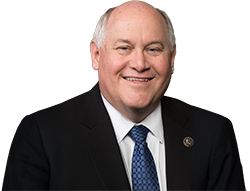Reps. Estes, Arrington, Colleagues Introduce Balanced Budget Amendment
Washington,
February 14, 2024
|
Roman Rodriguez
(316-262-8992)
Last week, Reps. Ron Estes (R-Kansas), Jodey C. Arrington (R-Texas), Rudy Yakym (R-Indiana), Tim Burchett (R-Tennessee), Jeff Duncan (R-South Carolina) and Jake Ellzey (R-Texas) introduced H.J.Res. 113, the Business Cycle Balanced Budget Amendment. This legislation would require the federal government to balance its budget and rein in out-of-control spending.
"Our country borrows about $90,000 per second, each American is on the hook for $100,000 of debt and between January and October of this year our national debt is expected to increase from $34 trillion to $36 trillion," said Rep. Estes. "These numbers aren't overblown talking points, they're undisputed facts that are detrimental to the health and safety of our nation. In the last three decades, our debt has exponentially increased more than 600%. I've consistently called for a balanced budget amendment to our Constitution to start to address this spending crisis, and I fully support Budget Chairman Arrington's proposal as an original cosponsor." "With $34 trillion in debt and a sovereign debt crisis looming on the horizon, the fiscal health of our nation is in rapid decline. If past is prologue, Congress will not demonstrate the political courage necessary to rein in spending and reduce the debt, which is why I introduced the Business Cycle Balanced Budget Amendment," said Budget Committee Chairman Arrington. "This legislation offers a strategic approach to balancing our budget while providing flexibility for inevitable economic down cycles. If ratified, this amendment would force the federal government to operate responsibly like every American business or family and live within our means." The Business Cycle Balanced Budget Amendment would balance the budget based on a three-year rolling average of revenue, which would smooth the budget balancing process and give greater predictability from year to year – allowing for fluctuations that occur over various business and economic cycles. The bill also establishes a gradual ten-year transition from ratification to balance and allows for deficits in times of emergency. |







